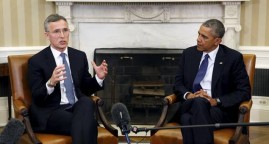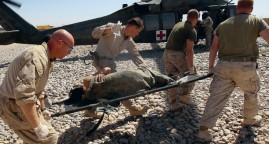International humanitarian aid
Article published on France Diplomatie website on 03/22/2018
A new French strategy to address growing needs
In the face of an increasing number of crises, their longer duration and more complex nature, humanitarian aid needs continue to grow across the world. To provide itself the resources to address these needs, France is entering a new phase in its commitment to humanitarian action by adopting a new humanitarian strategy for the next four years in tripling its annual financial contributions by 2022.
Humanitarian action: a pillar of our foreign policy
Humanitarian action aims to save lives and ensure the dignity of populations in countries affected by natural and man-made disasters by meeting their basic needs, such as access to water and sanitation, food, medical care and shelter. Humanitarian action is also a pillar of our foreign policy, which translates our solidarity with respect to crisis-affected people in concrete terms and contributes to international stability.
Growing needs
The number of people requiring humanitarian aid has more than doubled in five years, from 61.7 million in 2012 to 128.6 million in 2017. Estimates for 2018 put this figure at 135.7 million. (Source: the United Nations Office for the Coordination of Humanitarian Affairs-OCHA)
Longer crises
Crises have also become more prolonged. UN inter-agency calls for humanitarian funding in a given country or zone now have an average duration of eight years; 84% of humanitarian aid is allocated to crises of more than three years, and 69% to crises lasting more than ten years.
Growing violations of international humanitarian law
Violations of the basic rules of international humanitarian law (IHL) are becoming increasingly common. Civilian populations and property are attacked, with markets and schools targeted directly. Humanitarian stakeholders are also targets and attacks against them have risen significantly, tripling in the past 20 years. Attacks against the wounded and medical personnel, blocked access to medical care and the destruction of medical facilities have also reached extremely worrying levels. The indiscriminate use of explosives in populated areas has also had dramatic consequences for civilian populations. While such violations are not new, they appear to be used more systematically to achieve a military advantage in conflict.
Solidarity, the main focus of France’s external policy
Through its humanitarian strategy 2018-2022, France translates its desire to make humanitarian more effective in 15 concrete decisions. By boosting its means (tripling its contributions with respect to 2017 to reach €500 million a year by 2022), it increasingly focuses its work on solidarity and international stability.
These commitments are to:
1. build a strong coalition of States to step up protection of humanitarian and medical personnel in conflicts.
2. promote the protection of children in armed conflict.
3. pursue its commitment to the Women, Peace and Security Agenda by supporting actions that provide specific assistance to women and girls to further their reintegration and empowerment and especially income-generating activities.
4. continue to participate in the intergovernmental process begun following the 32nd International Conference of the Red Cross and Red Crescent to reach an agreement on a potential forum of States to enhance compliance with international humanitarian law by creating a space for dialogue.
5. pursue its efforts to rally as much support as possible, including from permanent members of the Security Council, for its goal of regulating the use of the veto in the event of mass atrocities.
6. continue to combat impunity to the fullest extent, particularly with regard to IHL violations in conflicts, and especially in the Middle East.
7. work with its partners and in relevant forums to ensure the full application of international humanitarian law to cyberspace.
8. develop constructive and demanding humanitarian dialogue through regular consultations with its main partners, whether parties to a conflict or emerging humanitarian actors, to promote IHL compliance and encourage possible cooperation.
9. pursue its efforts to communicate IHL principles to its armed forces and abroad and implementation of its operational practices for protecting civilians in external theatres of operations.
10. become one of the top three European donors and one of the top five global donors providing a total of €500 million in humanitarian aid contributions.
11. draw up a new methodology and simplified tracking tool for humanitarian funding that is more accessible and used by all relevant departments.
12. adopt the pilot project in 2018 to harmonize and streamline the reporting processes put forward in the Grand Bargain for all its bilateral humanitarian response funding mechanisms.
13. develop, as early as the emergency response phase and where justified by the context or crisis, a long-term strategy to respond to post-crisis challenges and recovery, developed jointly by the French Government and all humanitarian response and development stakeholders.
14. apply the OECD’s gender marker to all of its bilateral humanitarian projects and continue to advocate for UN and European agencies, funds and programmes to include it.
15. acquire a capacity-building mechanism for local stakeholders to give each NGO project financed by the Emergency Humanitarian Fund a portion of funds for capacity building of their local partners, increase its funding for local stakeholders and implement a marker to measure the degree of localization of its humanitarian action.
Download the document International humanitarian aid
Related Articles
Moscow-Washington, Eurasian issues of the Syrian crisis
06/04/2016. Recent developments indicate deep antagonisms that are beyond the regional framework.
Updated Commentaries bring fresh insights on continued relevance of Geneva Conventions
03/17/2016. Further clarifications with the adviser in the Legal Division of the ICRC.
The Strategic Interests of the European Union
09/26/2016. The mention of major challenges faced today by the international community logically provides a framework for Europe’s strategic agenda.






